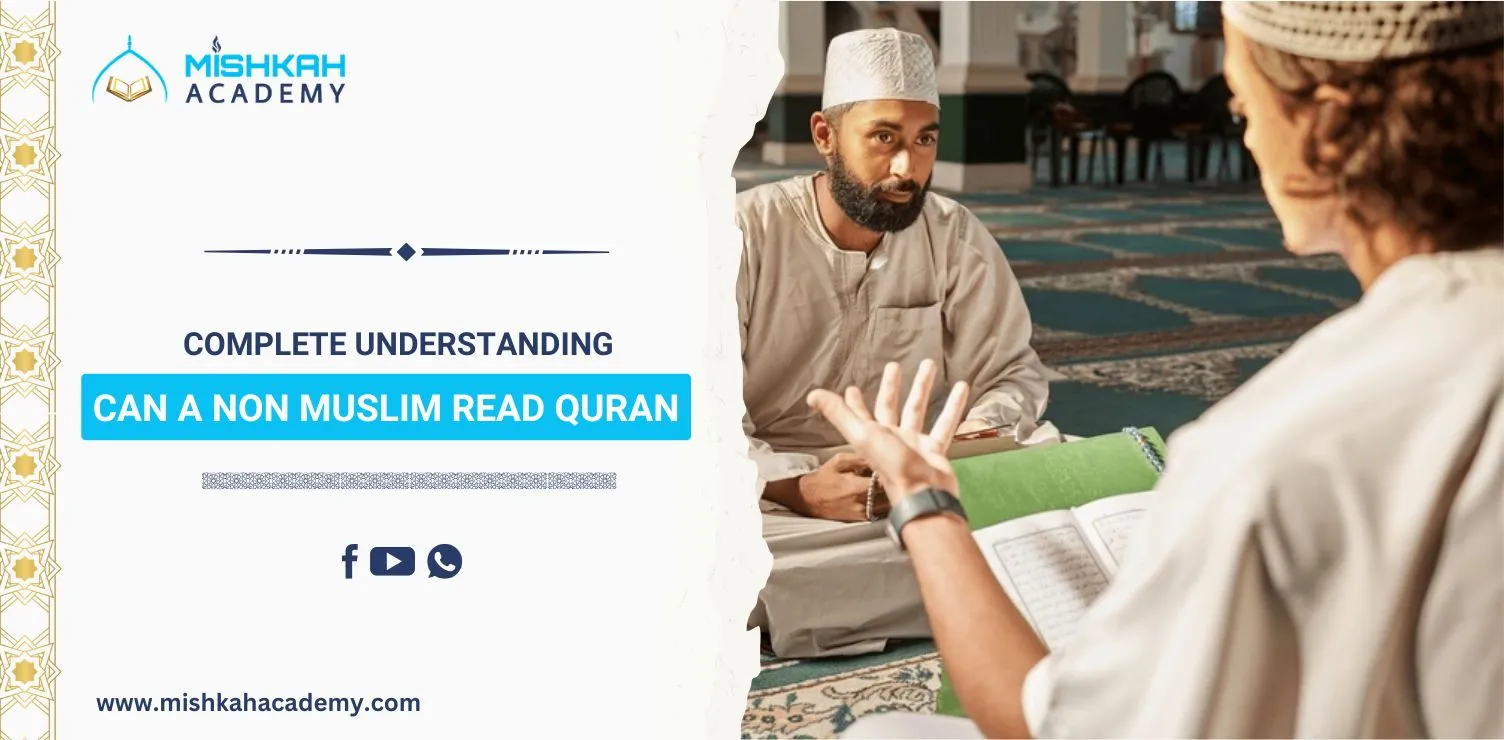Quran For Non-Muslims
Table of Contents
ToggleThe Quran is a sacred text for Muslims all over the world, is revered as a divine guide for humanity, offering wisdom, spiritual enlightenment, and moral principles. Islam encourages everyone, regardless of their faith, to explore its teachings and discover its universal messages of peace, compassion, and justice. The Quran teaches more than just one religion. It offers wisdom, guidance, and insights for everyone. Non-Muslims can read the Quran learn a lot from it. They can find comfort, inspiration, and a deeper understanding of life.
A common question often arises: Can a non-Muslim read and understand the Quran? The answer is a resounding yes that Non-Muslims can read and learn about the Quran all over the world.
But, can non-Muslims really get its meaning? At Miashkah _ New Muslim Academy, we think the Quran’s message is for everyone. It can reach people of all faiths or none.
In this article, we’ll look at the Quran’s universal knowledge and message of inclusivity. We’ll also explore its history in non-Muslim studies. Plus, we’ll give a detailed guide on how non-Muslims can read and understand the Quran. We’ll clear up common myths and talk about the Arabic language’s role in the Quran, importance of reading the Quran for non-Muslims, how they can benefit from it, and the various resources available to facilitate this journey, including Mishkah Academy’s specialized courses.
The Importance of Reading the Quran for Non-Muslims
The Quran is not just a book for Muslims; it addresses all of humanity. For non-Muslims, reading the Quran can serve as an introduction to Islamic beliefs, values, and the principles that guide over a billion Muslims worldwide. Understanding the Quran fosters interfaith dialogue, dispels misconceptions about Islam, and promotes mutual respect and understanding.
The Quran is filled with verses that emphasize universal values like justice, mercy, and compassion. Non-Muslims who study these teachings can appreciate the profound wisdom and ethical framework that Islam offers. Moreover, it provides insights into the shared heritage of Abrahamic religions, as the Quran discusses figures like Moses, Jesus, and Mary with reverence, highlighting the connections between Islam, Christianity, and Judaism.
Understanding the Universal Nature of Quranic Knowledge
The Quran is a treasure of wisdom that goes beyond religion and culture. It teaches us that we are all connected, showing us to include everyone. This message is for people of all faiths and backgrounds.
The Quran’s Message of Inclusivity
The Quran’s teachings are for everyone, not just Muslims. It invites people from all walks of life to seek wisdom. Many non-Muslim scholars have studied and interpreted the Quran for centuries.
Breaking Down Cultural Barriers
The Quran’s message can bridge cultural gaps. It helps us understand and value different viewpoints. Through the Quran, we find common values like justice, compassion, and spiritual growth.
Historical Perspectives on Non-Muslim Quranic Studies
Non-Muslim scholars have greatly contributed to Quranic studies. They have helped spread the Quran’s teachings. From medieval scholars to today’s experts, the Quran has inspired thinkers worldwide.
Miashkah – New Muslim Academy Provided comprehensive guides and resources for non-Muslims to understand and engage with the Quran.
Can a Non Muslim Read and Understand the Quran: A Comprehensive Guide
Yes, a non-Muslim can read and understand the Quran. This holy book of Islam is open to everyone. It offers wisdom and guidance for all humans. In this guide, we’ll show how non-Muslims can explore the Quran and find its deep insights.
The Quran welcomes everyone, not just Muslims. It invites people of all faiths to learn from its teachings. By reading the Quran with an open mind, non-Muslims can find its rich messages and life-changing impact.
Here’s a step-by-step guide for non-Muslims to read and understand the Quran:
- Learn about the Quran’s structure and main themes. It has 114 chapters, each with its own message.
- Look for good English translations of the Quran. These can help non-Arabic speakers understand its meaning.
- Use digital resources and apps made for non-Muslim readers. They offer guides, commentaries, and study materials.
- Understand the Quran’s historical and cultural background. Knowing about pre-Islamic Arabia can deepen your appreciation.
- Read the Quran with an open and respectful mind. Be ready to question your beliefs and assumptions.
By following this guide, non-Muslims can start a journey of discovery. They can unlock the Quran’s wisdom and find inspiration in its teachings. Whether you’re seeking spiritual knowledge or just curious, the Quran is waiting for you.
Common Misconceptions About Non-Muslims Reading the Quran
Many think the Quran is only for Muslims. But, it’s meant for everyone. It offers deep insights into faith, morality, and life.
Some believe non-Muslims can’t read the Quran. This is not true. The Quran is open to all, and many scholars from different faiths have studied it.
Others think non-Muslims can’t understand the Quran. But, its message is for all. With good translations and resources, anyone can learn from it.
Reading the Quran can change lives. It helps people appreciate Islamic beliefs and promotes understanding between faiths. It teaches about compassion, justice, and unity.
Miashkah from the New Muslim Academy wants to clear up these myths. He encourages everyone to explore the Quran. This way, we can build a more united society.
| Misconceptions | Facts |
|---|---|
| The Quran is only for Muslims. | The Quran is a universal scripture intended for all of humanity. |
| Non-Muslims are not allowed to read or study the Quran. | The Quran is accessible to everyone, and there are no restrictions on who can read or learn from its teachings. |
| Non-Muslims cannot fully comprehend the true meaning and essence of the Quran. | The Quran’s message is universal and can be understood by people of diverse backgrounds with the help of translations and study resources. |
Advantages of Reading the Quran Online
In today’s digital age, accessing the Quran has become easier than ever. Online platforms provide translations, tafsir (interpretations), and audio recitations that cater to diverse learning styles and preferences. Here are some key advantages of reading the Quran online:
- Accessibility: Online resources allow you to explore the Quran from the comfort of your home, anytime and anywhere.
- Interactive Learning: Platforms like Mishkah Academy offer interactive tools such as live sessions with tutors, discussion forums, and quizzes to enhance understanding.
- Personalized Approach: Learners can choose translations and commentaries that align with their language and cultural background, making the Quran’s message more relatable.
- Flexibility: Online learning accommodates various schedules, enabling non-Muslims to study at their own pace.
- Affordability: Many platforms, including Mishkah Academy, offer free trial lessons to ensure affordability for all learners.
Learn How to Read the Quran for Non-Muslims
Learning to read and understand the Quran as a non-Muslim may seem daunting, but with the right approach and guidance, it becomes a rewarding experience. Here are steps to embark on this journey:
- Start with Translations: Begin by exploring reliable translations of the Quran in your language. This helps you grasp its meanings without the need for Arabic fluency.
- Understand the Context: Reading the Quran alongside tafsir (interpretation) clarifies the historical and spiritual context of its verses.
- Seek Guidance from Experts: Enroll in courses like Mishkah Academy’s New Muslim Reverts Course to learn directly from experienced tutors.
- Focus on Themes: Concentrate on themes like justice, mercy, and monotheism to understand the Quran’s core messages.
- Practice Regularly: Consistent reading and reflection deepen comprehension and connection with the text.
For non-Muslims interested in learning more about Islam, Mishkah Academy offers comprehensive resources, including New Shahada Classes that introduce the basics of the faith.
How to Enroll in the New Muslim Course
Mishkah Academy has designed a unique New Muslim Reverts Course to guide non-Muslims and new converts in understanding Islam and the Quran. Here’s how you can enroll:
- Visit the Website: Start by exploring the Mishkah Academy’s official website.
- Browse Available Courses: Navigate to the ‘Courses’ section to find the New Muslim Reverts Course.
- Sign Up for a Free Trial: Take advantage of Mishkah’s Free Trial Lesson to experience the teaching methods and curriculum.
- Select Your Plan: Choose a suitable course package based on your learning goals and schedule.
- Start Learning: Begin your journey with professional tutors who provide personalized guidance tailored to your needs.
Whether you’re exploring Islam out of curiosity or seeking spiritual growth, Mishkah Academy offers a supportive environment to help you achieve your goals.
Conclusion
The Quran is a treasure trove of wisdom and guidance, accessible to all who seek to understand its messages. For non-Muslims, reading the Quran is an opportunity to learn about Islam, foster interfaith understanding, and reflect on universal values that resonate across cultures and religions.
Online platforms like Mishkah Academy make this journey easier by providing accessible, affordable, and personalized learning experiences. From translations and interactive courses to one-on-one tutoring, the resources are abundant. Enroll in Mishkah Academy’s New Muslim Reverts Course or explore their New Shahada Classes to start your journey today.
Remember, the Quran invites all of humanity to reflect and learn, as it states:
“This is a blessed Scripture which We have revealed unto you, that they might reflect on its verses, and that those of understanding may be mindful.” (Quran 38:29)
Embark on this enlightening path and discover the profound teachings of the Quran with Mishkah Academy, where knowledge meets guidance.
FAQs
Can a Non-Muslim Read the Quran without Wudu!
Yes, a non-Muslim can read the Quran without performing wudu (ablution). While wudu is recommended for Muslims when handling or reciting the Quran as a sign of respect and purity, it is not obligatory for non-Muslims who wish to explore or learn from the Quran. For non-Muslims, engaging with the Quran is often seen as an opportunity to understand Islam and its teachings, which can foster spiritual curiosity and interfaith understanding. It is advisable, however, to approach the Quran with sincerity, respect, and an open heart, as it is considered a sacred text in Islam. Some Muslims may prefer non-Muslims to handle translations of the Quran rather than the original Arabic text, as translations are not considered to have the same sanctity.
Can a Non-Muslim Hold the Quran!
Yes, a non-Muslim can hold the Quran, but it is a subject of varying opinions among Islamic scholars. Some scholars maintain that only those in a state of ritual purity should handle the Quran directly, based on traditional interpretations of Islamic texts. Others argue that non-Muslims may hold and read the Quran to learn about Islam, as spreading knowledge and inviting people to understand the faith is encouraged. Many emphasize the importance of handling the Quran with respect, regardless of one’s faith, given its sacred status in Islam. For non-Arabic speakers, translations of the Quran are often recommended, as they are considered interpretations rather than the actual divine text.
Can a non-Muslim Touch the Quran!
The question of whether a non-Muslim can touch the Quran is often discussed among Islamic scholars. The Quran itself is regarded as the sacred word of Allah, and Muslims hold it in the highest reverence. Many scholars interpret verses like “None shall touch it except the purified” (Quran 56:79) to mean that only those in a state of ritual purity should physically handle it. Based on this, some argue that non-Muslims, not performing ritual purification, should avoid touching the Arabic Mushaf (physical Quran in its original Arabic). However, others, particularly in contemporary contexts, emphasize the importance of sharing the Quran’s teachings, allowing non-Muslims to respectfully handle translations or even the Arabic text to learn about Islam. This lenient view aligns with the Quran’s universal message and the need for inclusivity in dawah (inviting others to Islam), provided it is done with respect and sincerity.
How to Read the Quran as a Non-Muslim!
As a non-Muslim, reading the Quran can be a meaningful and insightful experience. Begin by approaching it with respect and an open mind, understanding that it is the sacred scripture of Islam. To start, obtain a reliable translation, as the Quran is originally in Arabic; translations by scholars like Abdullah Yusuf Ali or Muhammad Asad are widely appreciated. Consider reading with the intention of understanding its core themes, such as monotheism, morality, and human purpose. Familiarize yourself with its structure—114 chapters (surahs) of varying lengths—and context, which is essential for deeper comprehension. If possible, use supplementary resources like commentaries (tafsir) or enroll in a Quranic study course to gain insights into its historical and spiritual significance.
Why a Non-Muslim should Read Quran!
A non-Muslim should consider reading and learning more about the Quran to gain a deeper understanding of Islam, a religion embraced by over a billion people worldwide, and to foster mutual respect and interfaith harmony. The Quran offers profound insights into life’s purpose, ethical living, and universal values like compassion, justice, and the sanctity of human life, which resonate beyond religious boundaries. By exploring its teachings, a non-Muslim can dispel misconceptions, appreciate the rich spiritual and cultural heritage of Muslims, and engage in informed, meaningful dialogue. This journey can also provide a unique perspective on shared principles across various faiths and philosophies, enriching personal growth and understanding.






